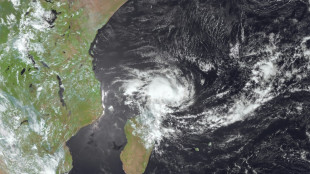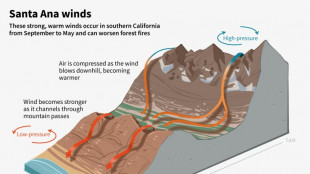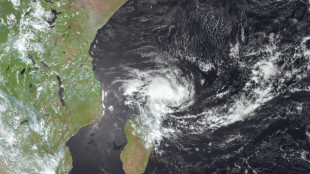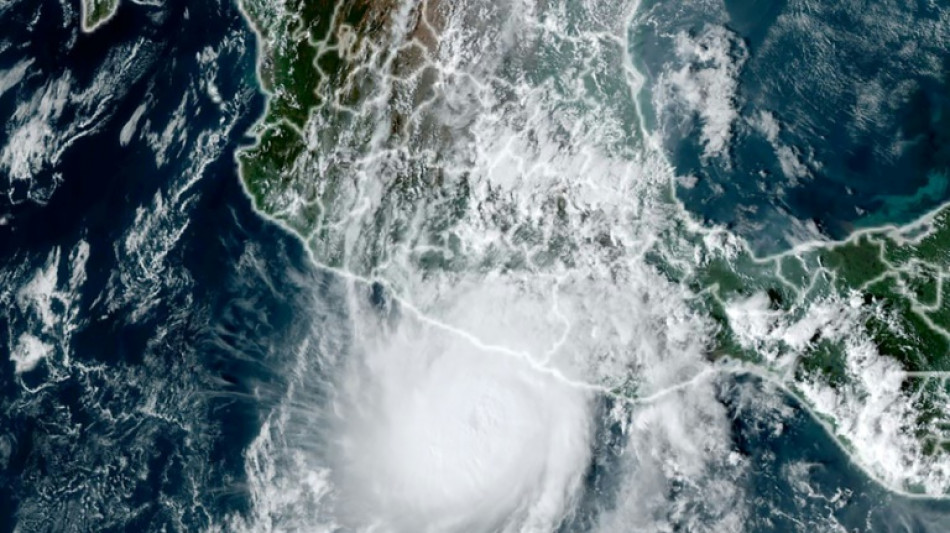
-
 'Sensational' Arsenal back in title race: Arteta
'Sensational' Arsenal back in title race: Arteta
-
Survivors count the mental cost of Los Angeles fires
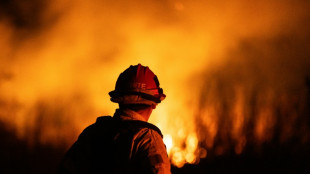
-
 Arsenal reignite Premier League title charge as Isak stars again
Arsenal reignite Premier League title charge as Isak stars again
-
Thousands across Gaza celebrate ceasefire deal

-
 Postecoglou slams 'nowhere near good enough' Spurs after Arsenal defeat
Postecoglou slams 'nowhere near good enough' Spurs after Arsenal defeat
-
Moyes 'under no illusions' after defeat on Everton return

-
 Arsenal reignite Premier League title hopes as Isak stars again
Arsenal reignite Premier League title hopes as Isak stars again
-
Yamal drives dominant Barca past Betis into Copa del Rey quarters

-
 Arsenal fightback sinks Spurs to ignite title bid
Arsenal fightback sinks Spurs to ignite title bid
-
Qatar, US announce Gaza truce, hostage release deal

-
 US consumer inflation rises in December but underlying pressures ease
US consumer inflation rises in December but underlying pressures ease
-
McGregor accused of sexual assault in civil suit

-
 Inter's title defence slowed by draw with spirited Bologna
Inter's title defence slowed by draw with spirited Bologna
-
Isak fires Newcastle into Premier League top four, Moyes misery

-
 Sane hits brace as Bayern thump Hoffenheim
Sane hits brace as Bayern thump Hoffenheim
-
Aston Villa ruin Moyes' Everton return

-
 Norman replaced as CEO of LIV Golf
Norman replaced as CEO of LIV Golf
-
SpaceX delays latest Starship megarocket test to Thursday

-
 Quake-stricken Vanuatu heads to polls in snap election
Quake-stricken Vanuatu heads to polls in snap election
-
Qatar, US announce Gaza truce, hostage release deal agreed

-
 Galaxy sign Zanka from Anderlecht
Galaxy sign Zanka from Anderlecht
-
Police probe abuse of Havertz's wife after Arsenal star's woes

-
 Drake files defamation suit against Universal over Kendrick Lamar track
Drake files defamation suit against Universal over Kendrick Lamar track
-
Qatar PM says Gaza truce, hostage release deal agreed

-
 US firms concerned about Trump tariff, immigration plans: Fed
US firms concerned about Trump tariff, immigration plans: Fed
-
Yellen warns against extending Trump's first-term US tax cuts

-
 Biden hails Gaza deal, says worked with Trump
Biden hails Gaza deal, says worked with Trump
-
US Supreme Court weighs Texas age-check for porn sites

-
 Brad Pitt isn't messaging you, rep warns, after adoring fan scammed
Brad Pitt isn't messaging you, rep warns, after adoring fan scammed
-
Trump's Energy Dept pick wants to develop renewables... and fossil fuels

-
 Cuba starts freeing prisoners after US terror list deal
Cuba starts freeing prisoners after US terror list deal
-
Fire-wrecked Los Angeles waits for winds to drop

-
 Prince William makes pub visit to meet fellow Aston Villa fans
Prince William makes pub visit to meet fellow Aston Villa fans
-
Mediators announce Gaza truce, but Israel says some points 'uresolved'

-
 Van Dijk laughs off talk of Liverpool wobble after more dropped points
Van Dijk laughs off talk of Liverpool wobble after more dropped points
-
Rubio vows to confront 'dangerous' China, deter Taiwan invasion

-
 Man City's Premier League title defence is over: Foden
Man City's Premier League title defence is over: Foden
-
Society centred around women in UK during Iron Age: scientists
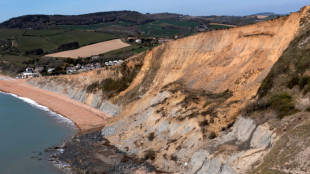
-
 UK government bans 'zombie drug' xylazine
UK government bans 'zombie drug' xylazine
-
Israel, Hamas agree deal for Gaza truce, hostage release: source briefed on talks

-
 Kosovo raids Serbia-linked offices as tense elections loom
Kosovo raids Serbia-linked offices as tense elections loom
-
Social media star Maher says rugby union must do more to grow game

-
 Upping defence spending 'key point' for NATO summit: ministers
Upping defence spending 'key point' for NATO summit: ministers
-
Russian inflation climbs as Ukraine offensive weighs on economy

-
 South Africa's Nortje ruled out of Champions Trophy
South Africa's Nortje ruled out of Champions Trophy
-
US bans controversial red food dye, decades after scientists raised alarm

-
 Rubio says China cheated its way to power, rejects 'liberal world order'
Rubio says China cheated its way to power, rejects 'liberal world order'
-
US bank profits rise as Wall Street hopes for merger boom

-
 Methane leaks from Nord Stream pipeline blasts revised up: studies
Methane leaks from Nord Stream pipeline blasts revised up: studies
-
Humanity has opened 'Pandora's box of ills,' UN chief warns


Why did Hurricane Otis 'explosively' intensify off Mexico?
Hurricane Otis caused at least 27 deaths and major damage as it battered Mexico's beachside city of Acapulco as a scale-topping category 5 storm, according to officials.
The speed with which Otis rapidly intensified took the government and weather forecasters by surprise, leaving little time to issue warnings and prepare for its arrival.
Why was Otis so devastating?
"Otis's intensification was very exceptional. It was nearly record-breaking in some ways," said Michael Brennan, director of the Miami-based National Hurricane Center (NHC).
Within hours Otis strengthened from a tropical storm to the most powerful category of the five-step Saffir-Simpson scale before hitting land early Wednesday.
Otis "explosively intensified" with peak wind speeds increasing by 115 miles per hour over a 24-hour period, according to the NHC, which issues storm warnings and forecasts.
Otis was packing maximum sustained winds of 165 miles (265 kilometers) per hour when it hit the coast, the NHC said.
The World Meteorological Organization described the hurricane as "one of the most rapidly intensifying tropical cyclones on record," only exceeded in modern times by Hurricane Patricia in 2015.
Why did Otis intensify so quickly?
"Unfortunately Otis was able to take advantage of very favorable conditions" including warm deep ocean water and a conducive atmospheric environment, Brennan said.
"The storm was able to develop an inner core and a structure that allowed it to take advantage of those favorable conditions and environment in the ocean and the atmosphere to rapidly intensify," he said.
While hurricanes hit Mexico every year on both its Pacific and Atlantic coasts, usually between May and November, few make landfall as a Category 5.
"There are no hurricanes on record even close to this intensity for this part of Mexico," the NHC had said as Otis approached the Mexican coast, warning that a "nightmare scenario" was unfolding.
Is climate change to blame?
The water temperatures off the Mexican coast that Otis encountered were 30 to 31 degrees Celsius (86-88 degrees Fahrenheit), Brennan said.
"That may be a little bit warmer than usually but not tremendously so. That area is usually quite warm and has quite deep warm ocean water this time of year," he added.
"So it's hard to necessarily attribute that particular aspect of this to climate change or global warming. We'll have to look back and do some studies," Brennan said.
Will global warming bring more devastating storms like Otis?
Brennan said that "the science on that is not terribly well resolved at this point."
"There are some studies that suggest that rapid intensification is becoming more common in a warming climate," he said.
"We are very confident that the impacts of hurricanes from heavy rainfall, flooding and storm surge are worsening in a warming climate and will continue to worsen as the climate warms," he added.
That was due to rising sea levels leading to more dangerous storm surges and a warmer atmosphere holding more moisture, resulting in heavier rainfall, Brennan said.
The UN's Intergovernmental Panel on Climate Change said in 2021 that the proportion of particularly intense cyclones (categories 4 and 5) should increase by 10 percent compared to the pre-industrial era with a warming of +1.5 degrees Celsius, by 13 percent at +2C and by 30 percent at +4C.
As a result of sea-level rise and marine flooding, more than one billion people will live in coastal cities at risk by 2050, according to the IPCC.
A.Jones--AMWN

